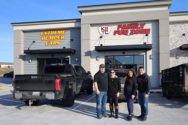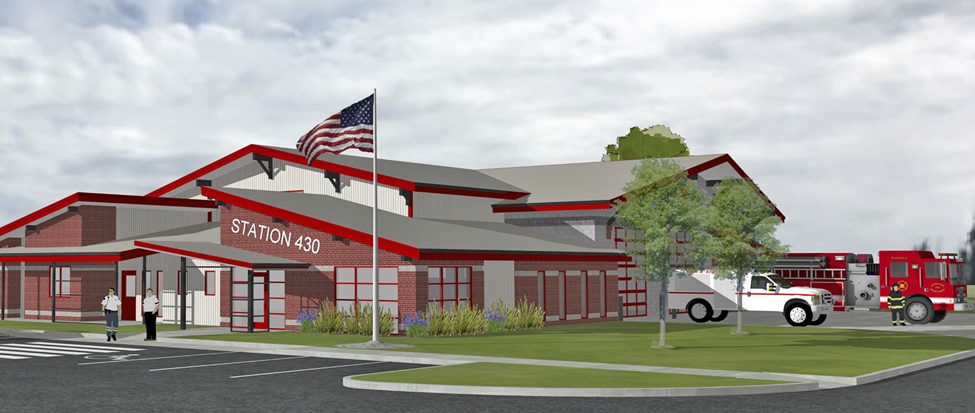
Home » New fire stations in the works around the Tri-Cities
New fire stations in the works around the Tri-Cities

December 13, 2018
Benton Fire District 4 hopes to have a new station up and running to serve West Richland area residents by summer 2019.
Fire Chief William Whealan said a design team is already working on building details; however, the location is not 100 percent secured, though one has been identified.
Pasco and Kennewick have plans for new stations, too.
Included in Pasco’s 2019-20 budget is $18.5 million in bonds to relocate Station 83 to Sandifur Parkway and Road 76 and replacing Station 84 on Road 52 north of Court Street. The city also has plans to buy land for stations 85 and 86.
Kennewick plans to build Station 6, estimated to cost about $9 million, in the Southridge area in 2022, replace Station 3 at 7400 W. Quinault Ave. in 2020 for $7 million, and Station 1 at 600 S. Auburn St. in 2021, also for $7 million.
Benton Fire District 4 voters approved a $7.6 million bond to build a station in August in the western part of the 52-square-mile district. A third station is necessary as call activity within the district has increased more than 60 percent in seven years and response times within the district have hit 17 minutes, said Whealan, adding that minutes can mean the difference between life or death.
“As population increases, so do the number of calls we receive. We forecast these numbers well in advance so we can plan to increase our emergency response capabilities and units to meet demand,” Whealan said.
It’s a similar theme across the Tri-Cities, where the population grew nearly 2 percent over the previous year to 283,830 people, according to state data.
As part of the bond financing process, Whealan said the district presented information to the national agency of Standard and Poor’s Global Ratings and received a rating of AA-. That means the district’s capacity to meet its financial obligations is very strong, and as a result, the estimated property tax impact of the bond is 25 cents per $1,000 of assessed property value. For a homeowner of $300,000 home, it would be about $6.25 per month.
The general obligation bonds will be used to build and equip the station with emergency vehicles and replace three fire engines and aging apparatus, like brush trucks, and the Jaws of Life, a device used during motor vehicle extractions.
“The ideal size of the station will be something that can serve the fire district for the next 50 years and have enough room to expand if needed,” Whealan said. “The facility also will improve the health and safety of our emergency personnel by having decontamination units and ventilation systems to remove harmful carcinogens from fires and vehicle exhaust.”
Prior to putting the bond on the ballot, Whealan met with economic development officials and West Richland city planners to determine future growth projections. Fire stations are ideally located away from residential areas because of their lights and sirens, Whealan said.
“That’s why commercial, commercial light industrial, or light industrial (properties) are a good fit,” said Whealan, who added that the city’s community development director, Aaron Lambert, suggested a piece of property the Port of Kennewick had been trying to sell.
“The property is about two acres and it’s within the city limits behind Black Heron Spirits (at 8011 Keene Road in West Richland),” said Port of Kennewick CEO Tim Arntzen. “We’ve had this property for five to seven years and haven’t had a lot of success selling it to the private sector. We started talking to the fire chief in July of this year to see if we had property available, so we put a deal together.”
The deal is a win for taxpayers as the port sold the property for $10,000; it is valued at more than $100,000.
“That’s $100,000 in the coffers for the fire district to use toward a building,” Arntzen said. “We wanted to put the property in the hands of the fire district for a reduced price. This is a project that was approved by the tax payers overwhelmingly—70 to 75 percent—so if they’re willing to tax themselves, the port wanted to be able to help keep the costs down.”
“This is a great example of government partnerships working to help people,” Whealan said. “The savings we will see in land costs can offset the sharply rising construction costs we are seeing in the Tri-Cities. We are deeply grateful to the port for their help.”
But while the property is a good location and shouldn’t need a lot of grading, there is a hitch in the plan.
Fire stations are typically allowed in most zones. The issue with this piece of property, said Whealan, is that the city did not identify fire stations in its light industry or commercial light industry zoning code. To move forward, an amendment is needed to the current zoning code.
The city and state must approve the amendment before a fire station can be built there. Meanwhile, the port is working with its attorney to get a purchase of sale agreement drafted.
In the event the text amendment is not approved, Whealan said the station can resell the property or keep it for future growth changes in the fire district that may occur within time. And if all goes well, Whealan said construction plans will move forward and the district will look to staff the new station using full- and part-time fire fighters, as well as volunteer personnel.
“The fire district is a combination department. This is the most financially prudent type of department for our taxpayers and community,” Whealan said. “We are actively recruiting volunteers and we will hire additional full-time personnel for the station as we are able.”
Real Estate & Construction
KEYWORDS december 2018





